Management Research: Exploring Managers' Role as Researchers
VerifiedAdded on 2022/11/18
|12
|3057
|216
Essay
AI Summary
This essay delves into the multifaceted roles of managers, emphasizing their significance as academic researchers within organizations. It begins by defining the roles of managers, drawing on the work of Henry Mintzberg and other management theorists, and highlights the importance of academic research in providing crucial information for strategic decision-making. The essay then explores the potential for managers to take on the role of academic researchers, examining the differences in approach, the challenges they may face, such as time constraints and skill gaps, and the benefits that arise when managers combine their management duties with research activities. The benefits include a deeper understanding of research findings, better access to internal and external data, and enhanced decision-making capabilities. The essay concludes by underscoring the advantages of this dual role for both the organization and the manager's personal development.
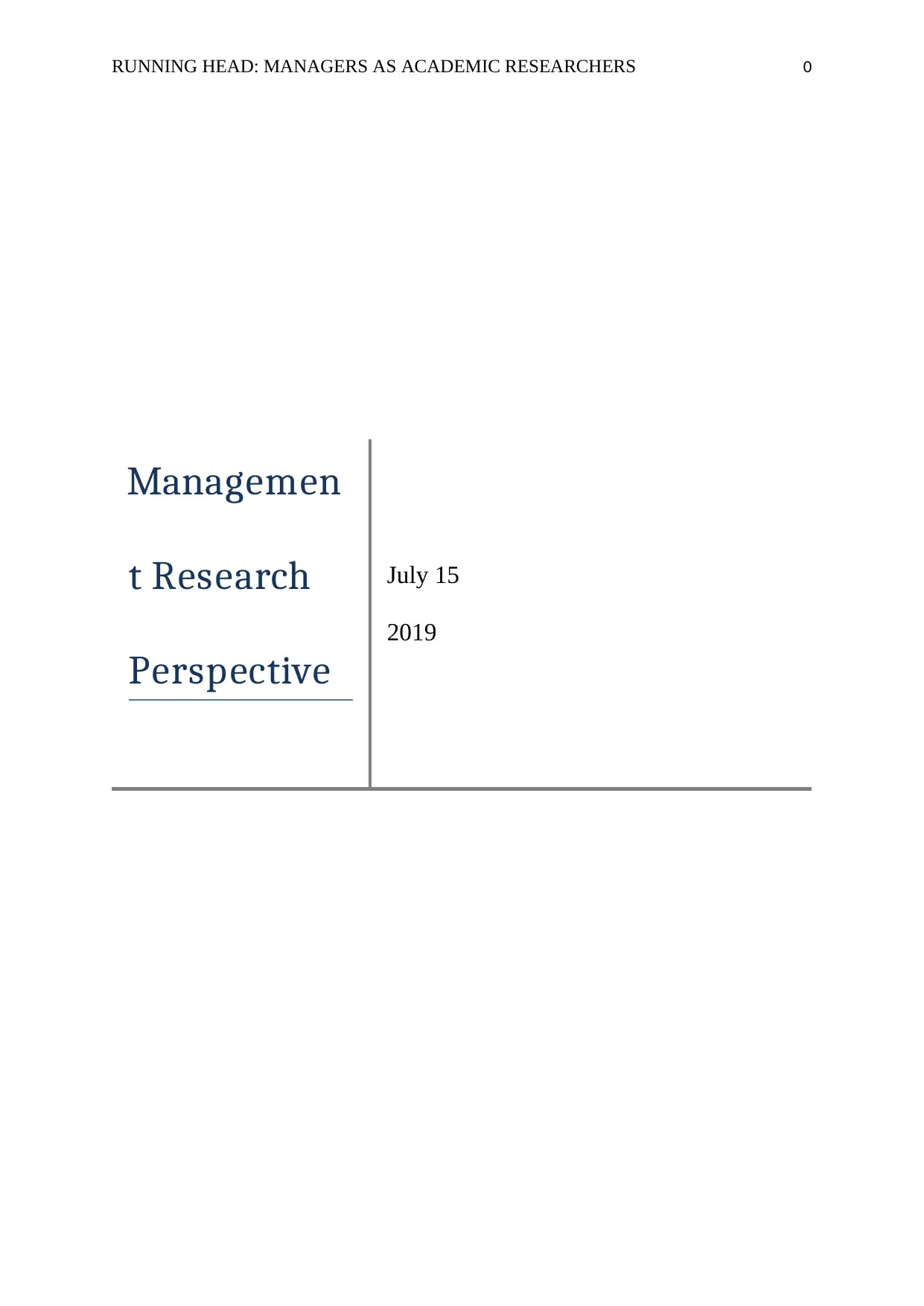
RUNNING HEAD: MANAGERS AS ACADEMIC RESEARCHERS 0
Managemen
t Research
Perspective
July 15
2019
Managemen
t Research
Perspective
July 15
2019
Paraphrase This Document
Need a fresh take? Get an instant paraphrase of this document with our AI Paraphraser
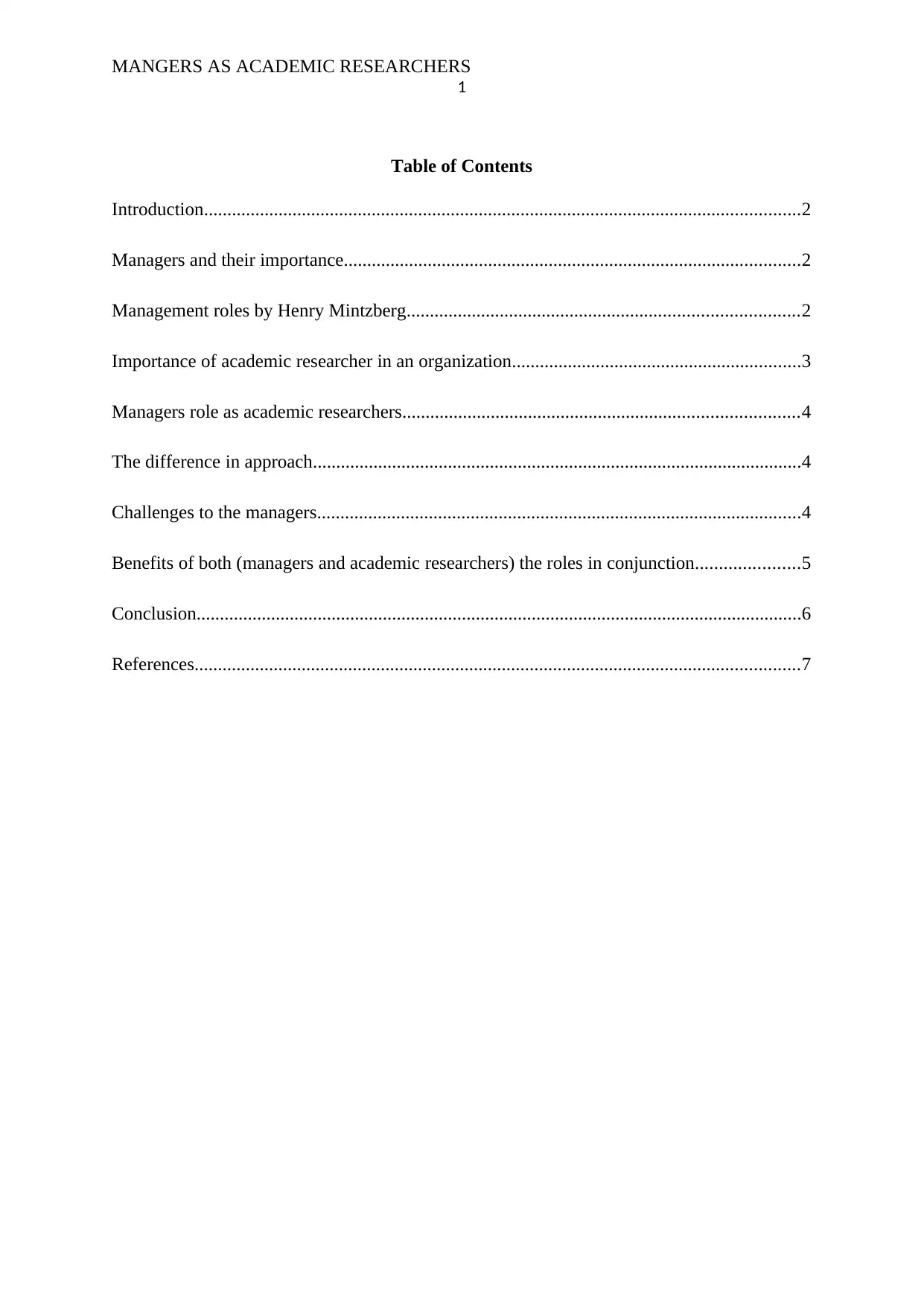
MANGERS AS ACADEMIC RESEARCHERS
1
Table of Contents
Introduction................................................................................................................................2
Managers and their importance..................................................................................................2
Management roles by Henry Mintzberg....................................................................................2
Importance of academic researcher in an organization..............................................................3
Managers role as academic researchers.....................................................................................4
The difference in approach.........................................................................................................4
Challenges to the managers........................................................................................................4
Benefits of both (managers and academic researchers) the roles in conjunction......................5
Conclusion..................................................................................................................................6
References..................................................................................................................................7
1
Table of Contents
Introduction................................................................................................................................2
Managers and their importance..................................................................................................2
Management roles by Henry Mintzberg....................................................................................2
Importance of academic researcher in an organization..............................................................3
Managers role as academic researchers.....................................................................................4
The difference in approach.........................................................................................................4
Challenges to the managers........................................................................................................4
Benefits of both (managers and academic researchers) the roles in conjunction......................5
Conclusion..................................................................................................................................6
References..................................................................................................................................7
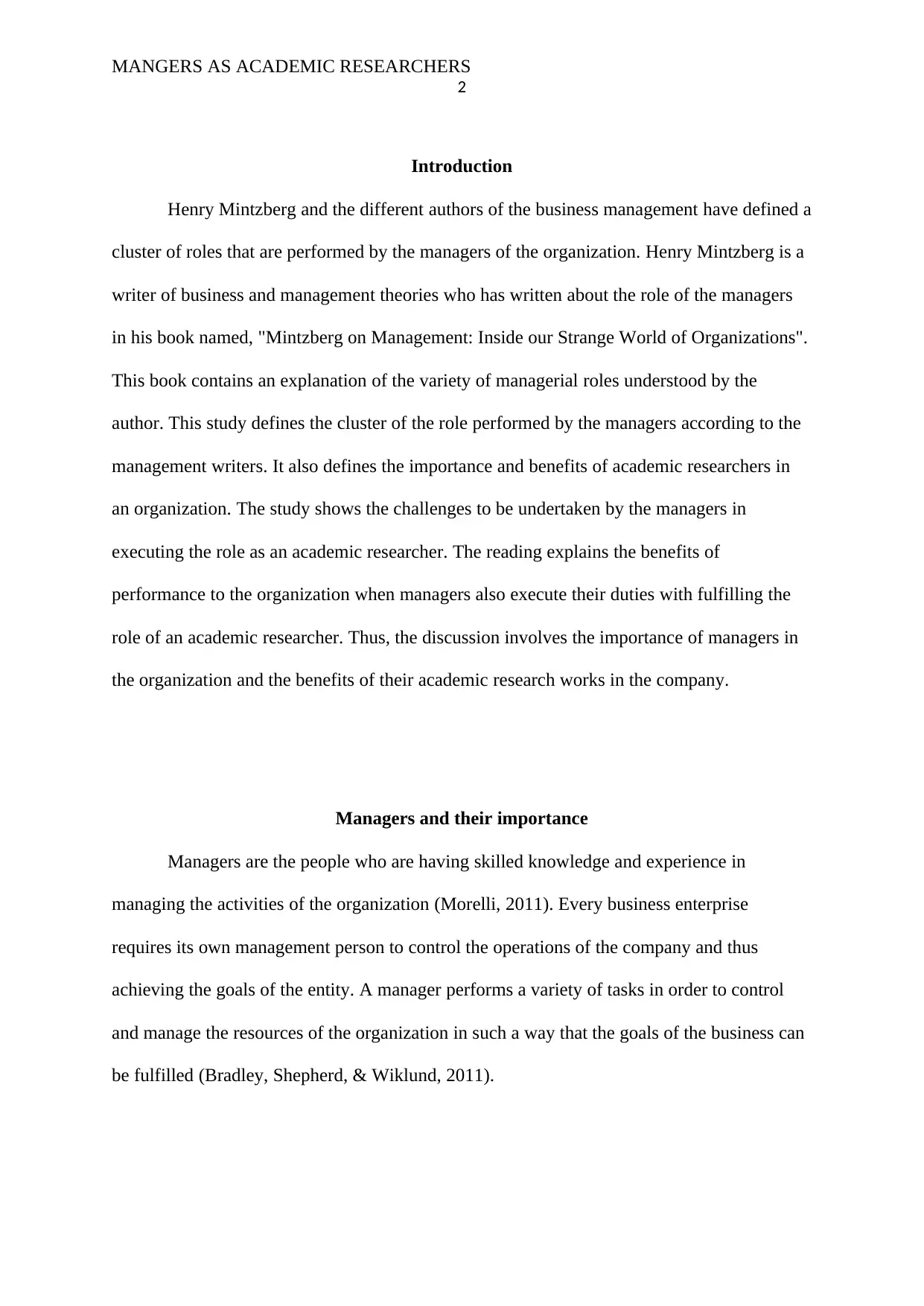
MANGERS AS ACADEMIC RESEARCHERS
2
Introduction
Henry Mintzberg and the different authors of the business management have defined a
cluster of roles that are performed by the managers of the organization. Henry Mintzberg is a
writer of business and management theories who has written about the role of the managers
in his book named, "Mintzberg on Management: Inside our Strange World of Organizations".
This book contains an explanation of the variety of managerial roles understood by the
author. This study defines the cluster of the role performed by the managers according to the
management writers. It also defines the importance and benefits of academic researchers in
an organization. The study shows the challenges to be undertaken by the managers in
executing the role as an academic researcher. The reading explains the benefits of
performance to the organization when managers also execute their duties with fulfilling the
role of an academic researcher. Thus, the discussion involves the importance of managers in
the organization and the benefits of their academic research works in the company.
Managers and their importance
Managers are the people who are having skilled knowledge and experience in
managing the activities of the organization (Morelli, 2011). Every business enterprise
requires its own management person to control the operations of the company and thus
achieving the goals of the entity. A manager performs a variety of tasks in order to control
and manage the resources of the organization in such a way that the goals of the business can
be fulfilled (Bradley, Shepherd, & Wiklund, 2011).
2
Introduction
Henry Mintzberg and the different authors of the business management have defined a
cluster of roles that are performed by the managers of the organization. Henry Mintzberg is a
writer of business and management theories who has written about the role of the managers
in his book named, "Mintzberg on Management: Inside our Strange World of Organizations".
This book contains an explanation of the variety of managerial roles understood by the
author. This study defines the cluster of the role performed by the managers according to the
management writers. It also defines the importance and benefits of academic researchers in
an organization. The study shows the challenges to be undertaken by the managers in
executing the role as an academic researcher. The reading explains the benefits of
performance to the organization when managers also execute their duties with fulfilling the
role of an academic researcher. Thus, the discussion involves the importance of managers in
the organization and the benefits of their academic research works in the company.
Managers and their importance
Managers are the people who are having skilled knowledge and experience in
managing the activities of the organization (Morelli, 2011). Every business enterprise
requires its own management person to control the operations of the company and thus
achieving the goals of the entity. A manager performs a variety of tasks in order to control
and manage the resources of the organization in such a way that the goals of the business can
be fulfilled (Bradley, Shepherd, & Wiklund, 2011).
⊘ This is a preview!⊘
Do you want full access?
Subscribe today to unlock all pages.

Trusted by 1+ million students worldwide
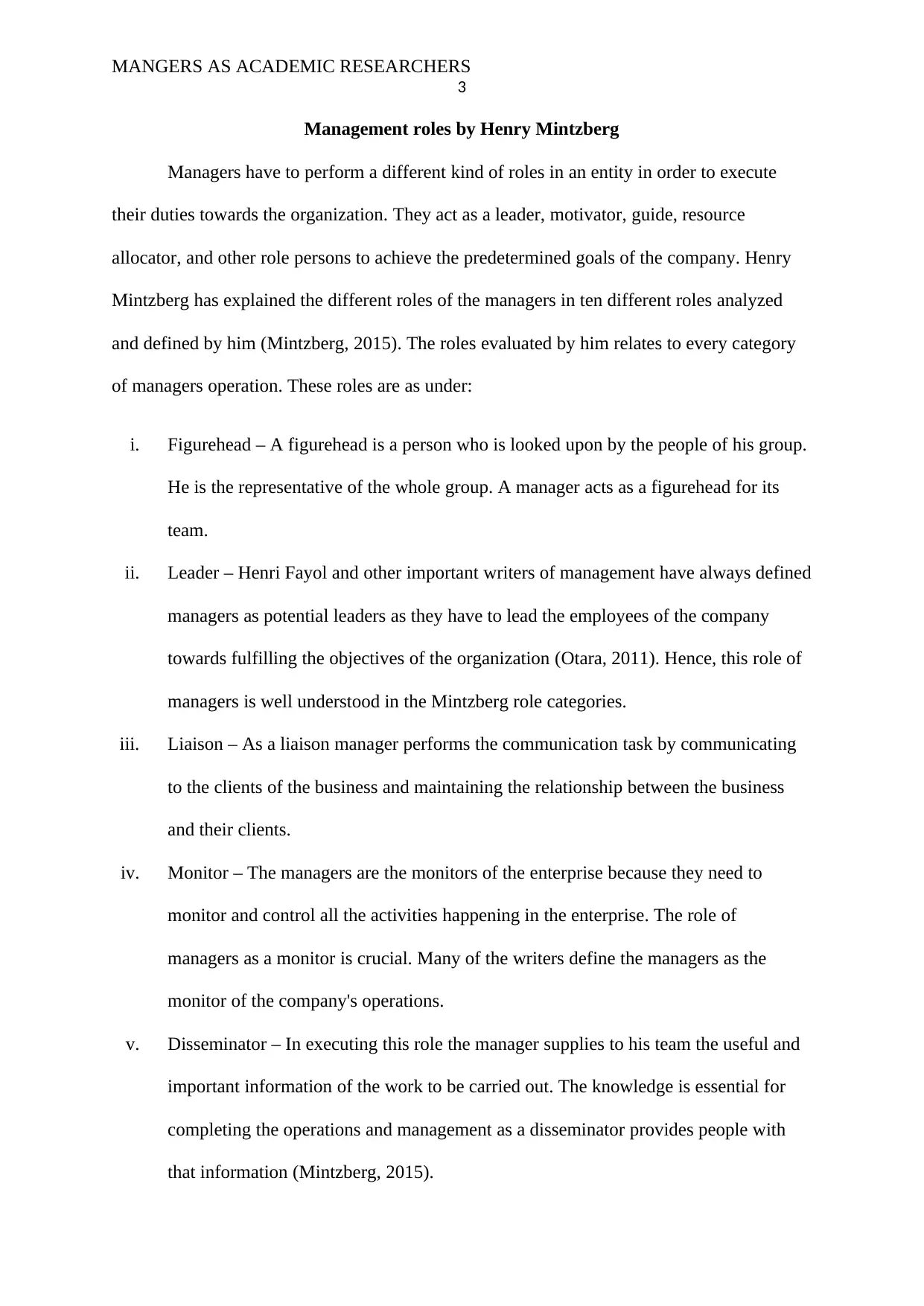
MANGERS AS ACADEMIC RESEARCHERS
3
Management roles by Henry Mintzberg
Managers have to perform a different kind of roles in an entity in order to execute
their duties towards the organization. They act as a leader, motivator, guide, resource
allocator, and other role persons to achieve the predetermined goals of the company. Henry
Mintzberg has explained the different roles of the managers in ten different roles analyzed
and defined by him (Mintzberg, 2015). The roles evaluated by him relates to every category
of managers operation. These roles are as under:
i. Figurehead – A figurehead is a person who is looked upon by the people of his group.
He is the representative of the whole group. A manager acts as a figurehead for its
team.
ii. Leader – Henri Fayol and other important writers of management have always defined
managers as potential leaders as they have to lead the employees of the company
towards fulfilling the objectives of the organization (Otara, 2011). Hence, this role of
managers is well understood in the Mintzberg role categories.
iii. Liaison – As a liaison manager performs the communication task by communicating
to the clients of the business and maintaining the relationship between the business
and their clients.
iv. Monitor – The managers are the monitors of the enterprise because they need to
monitor and control all the activities happening in the enterprise. The role of
managers as a monitor is crucial. Many of the writers define the managers as the
monitor of the company's operations.
v. Disseminator – In executing this role the manager supplies to his team the useful and
important information of the work to be carried out. The knowledge is essential for
completing the operations and management as a disseminator provides people with
that information (Mintzberg, 2015).
3
Management roles by Henry Mintzberg
Managers have to perform a different kind of roles in an entity in order to execute
their duties towards the organization. They act as a leader, motivator, guide, resource
allocator, and other role persons to achieve the predetermined goals of the company. Henry
Mintzberg has explained the different roles of the managers in ten different roles analyzed
and defined by him (Mintzberg, 2015). The roles evaluated by him relates to every category
of managers operation. These roles are as under:
i. Figurehead – A figurehead is a person who is looked upon by the people of his group.
He is the representative of the whole group. A manager acts as a figurehead for its
team.
ii. Leader – Henri Fayol and other important writers of management have always defined
managers as potential leaders as they have to lead the employees of the company
towards fulfilling the objectives of the organization (Otara, 2011). Hence, this role of
managers is well understood in the Mintzberg role categories.
iii. Liaison – As a liaison manager performs the communication task by communicating
to the clients of the business and maintaining the relationship between the business
and their clients.
iv. Monitor – The managers are the monitors of the enterprise because they need to
monitor and control all the activities happening in the enterprise. The role of
managers as a monitor is crucial. Many of the writers define the managers as the
monitor of the company's operations.
v. Disseminator – In executing this role the manager supplies to his team the useful and
important information of the work to be carried out. The knowledge is essential for
completing the operations and management as a disseminator provides people with
that information (Mintzberg, 2015).
Paraphrase This Document
Need a fresh take? Get an instant paraphrase of this document with our AI Paraphraser
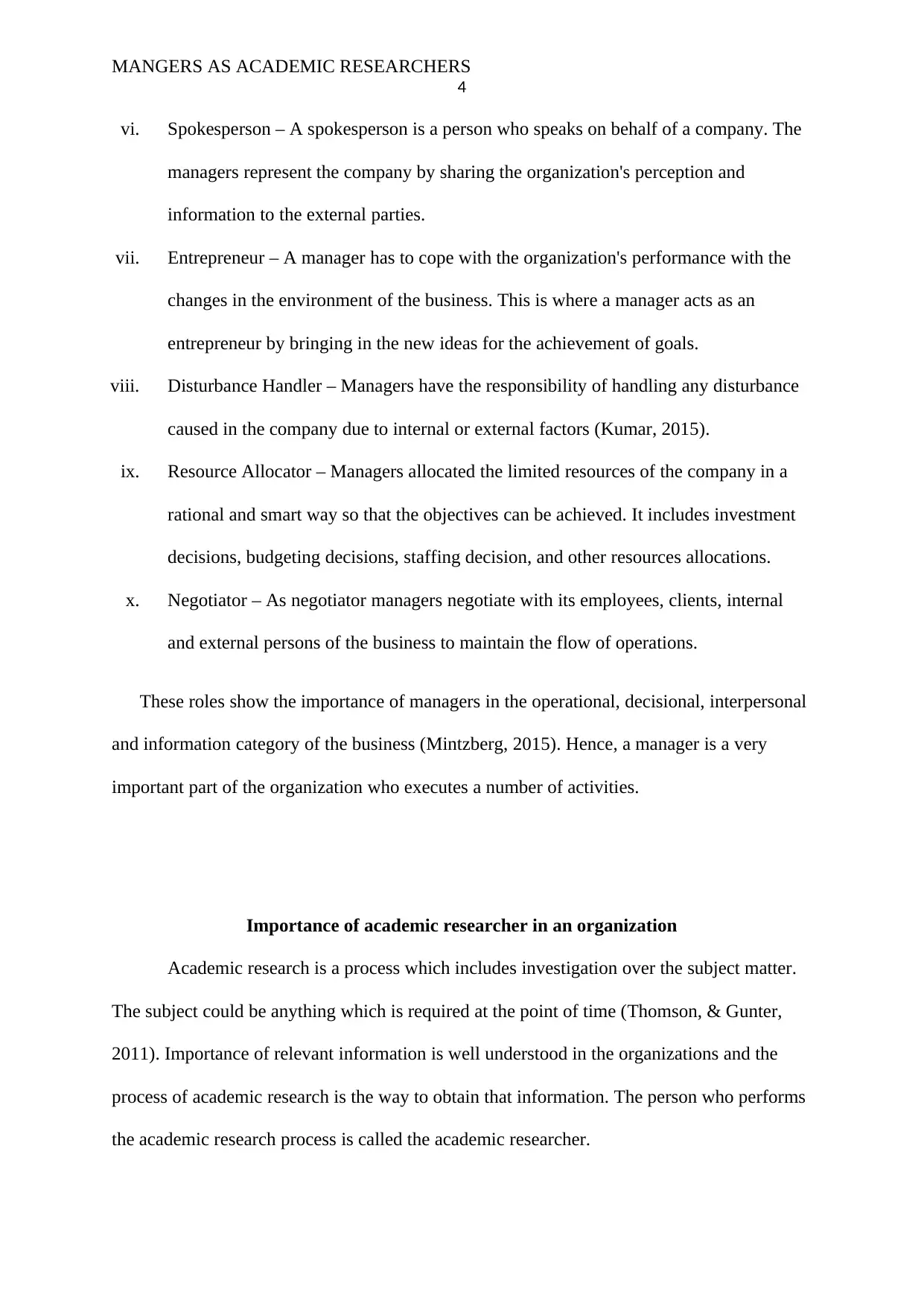
MANGERS AS ACADEMIC RESEARCHERS
4
vi. Spokesperson – A spokesperson is a person who speaks on behalf of a company. The
managers represent the company by sharing the organization's perception and
information to the external parties.
vii. Entrepreneur – A manager has to cope with the organization's performance with the
changes in the environment of the business. This is where a manager acts as an
entrepreneur by bringing in the new ideas for the achievement of goals.
viii. Disturbance Handler – Managers have the responsibility of handling any disturbance
caused in the company due to internal or external factors (Kumar, 2015).
ix. Resource Allocator – Managers allocated the limited resources of the company in a
rational and smart way so that the objectives can be achieved. It includes investment
decisions, budgeting decisions, staffing decision, and other resources allocations.
x. Negotiator – As negotiator managers negotiate with its employees, clients, internal
and external persons of the business to maintain the flow of operations.
These roles show the importance of managers in the operational, decisional, interpersonal
and information category of the business (Mintzberg, 2015). Hence, a manager is a very
important part of the organization who executes a number of activities.
Importance of academic researcher in an organization
Academic research is a process which includes investigation over the subject matter.
The subject could be anything which is required at the point of time (Thomson, & Gunter,
2011). Importance of relevant information is well understood in the organizations and the
process of academic research is the way to obtain that information. The person who performs
the academic research process is called the academic researcher.
4
vi. Spokesperson – A spokesperson is a person who speaks on behalf of a company. The
managers represent the company by sharing the organization's perception and
information to the external parties.
vii. Entrepreneur – A manager has to cope with the organization's performance with the
changes in the environment of the business. This is where a manager acts as an
entrepreneur by bringing in the new ideas for the achievement of goals.
viii. Disturbance Handler – Managers have the responsibility of handling any disturbance
caused in the company due to internal or external factors (Kumar, 2015).
ix. Resource Allocator – Managers allocated the limited resources of the company in a
rational and smart way so that the objectives can be achieved. It includes investment
decisions, budgeting decisions, staffing decision, and other resources allocations.
x. Negotiator – As negotiator managers negotiate with its employees, clients, internal
and external persons of the business to maintain the flow of operations.
These roles show the importance of managers in the operational, decisional, interpersonal
and information category of the business (Mintzberg, 2015). Hence, a manager is a very
important part of the organization who executes a number of activities.
Importance of academic researcher in an organization
Academic research is a process which includes investigation over the subject matter.
The subject could be anything which is required at the point of time (Thomson, & Gunter,
2011). Importance of relevant information is well understood in the organizations and the
process of academic research is the way to obtain that information. The person who performs
the academic research process is called the academic researcher.
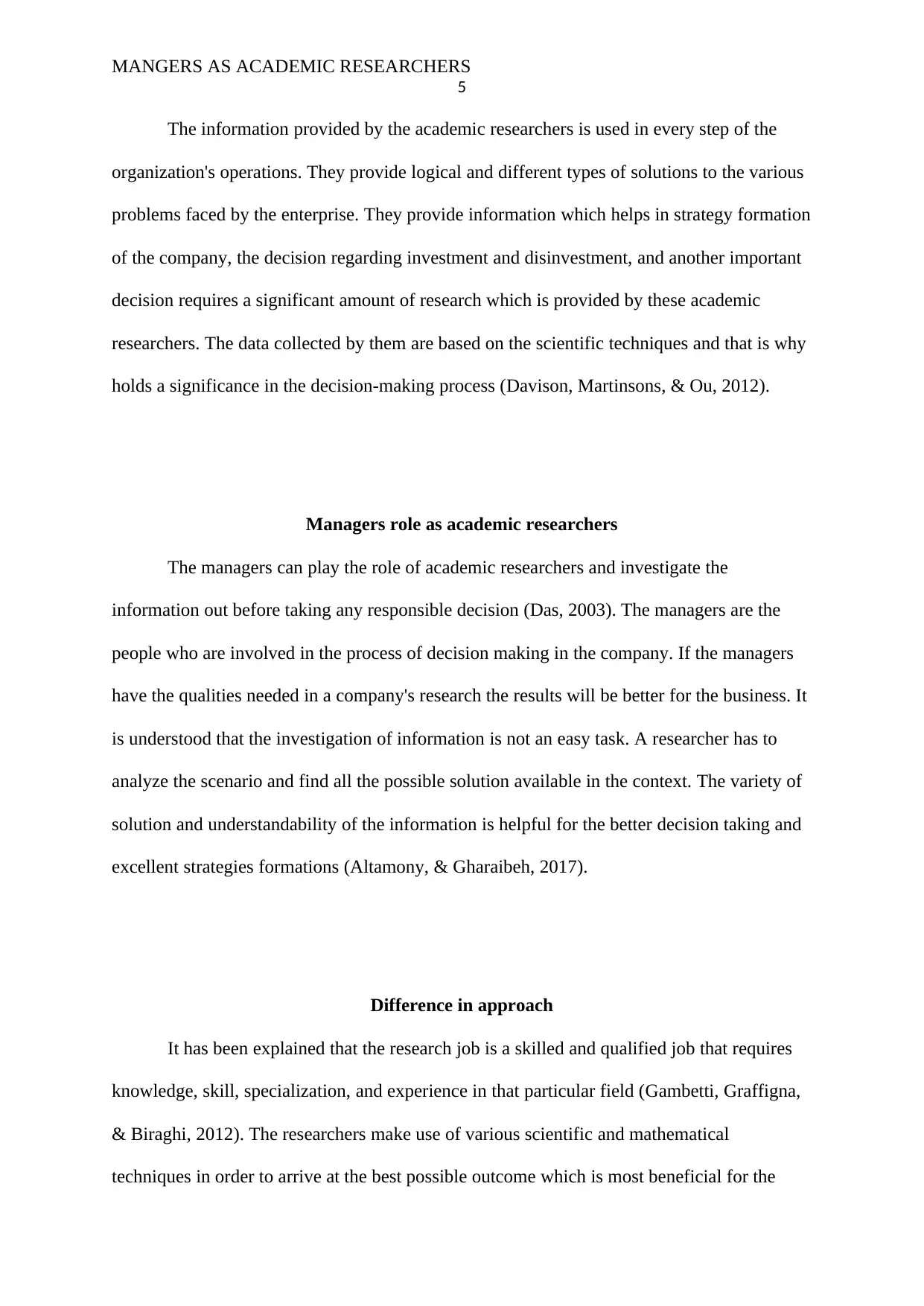
MANGERS AS ACADEMIC RESEARCHERS
5
The information provided by the academic researchers is used in every step of the
organization's operations. They provide logical and different types of solutions to the various
problems faced by the enterprise. They provide information which helps in strategy formation
of the company, the decision regarding investment and disinvestment, and another important
decision requires a significant amount of research which is provided by these academic
researchers. The data collected by them are based on the scientific techniques and that is why
holds a significance in the decision-making process (Davison, Martinsons, & Ou, 2012).
Managers role as academic researchers
The managers can play the role of academic researchers and investigate the
information out before taking any responsible decision (Das, 2003). The managers are the
people who are involved in the process of decision making in the company. If the managers
have the qualities needed in a company's research the results will be better for the business. It
is understood that the investigation of information is not an easy task. A researcher has to
analyze the scenario and find all the possible solution available in the context. The variety of
solution and understandability of the information is helpful for the better decision taking and
excellent strategies formations (Altamony, & Gharaibeh, 2017).
Difference in approach
It has been explained that the research job is a skilled and qualified job that requires
knowledge, skill, specialization, and experience in that particular field (Gambetti, Graffigna,
& Biraghi, 2012). The researchers make use of various scientific and mathematical
techniques in order to arrive at the best possible outcome which is most beneficial for the
5
The information provided by the academic researchers is used in every step of the
organization's operations. They provide logical and different types of solutions to the various
problems faced by the enterprise. They provide information which helps in strategy formation
of the company, the decision regarding investment and disinvestment, and another important
decision requires a significant amount of research which is provided by these academic
researchers. The data collected by them are based on the scientific techniques and that is why
holds a significance in the decision-making process (Davison, Martinsons, & Ou, 2012).
Managers role as academic researchers
The managers can play the role of academic researchers and investigate the
information out before taking any responsible decision (Das, 2003). The managers are the
people who are involved in the process of decision making in the company. If the managers
have the qualities needed in a company's research the results will be better for the business. It
is understood that the investigation of information is not an easy task. A researcher has to
analyze the scenario and find all the possible solution available in the context. The variety of
solution and understandability of the information is helpful for the better decision taking and
excellent strategies formations (Altamony, & Gharaibeh, 2017).
Difference in approach
It has been explained that the research job is a skilled and qualified job that requires
knowledge, skill, specialization, and experience in that particular field (Gambetti, Graffigna,
& Biraghi, 2012). The researchers make use of various scientific and mathematical
techniques in order to arrive at the best possible outcome which is most beneficial for the
⊘ This is a preview!⊘
Do you want full access?
Subscribe today to unlock all pages.

Trusted by 1+ million students worldwide
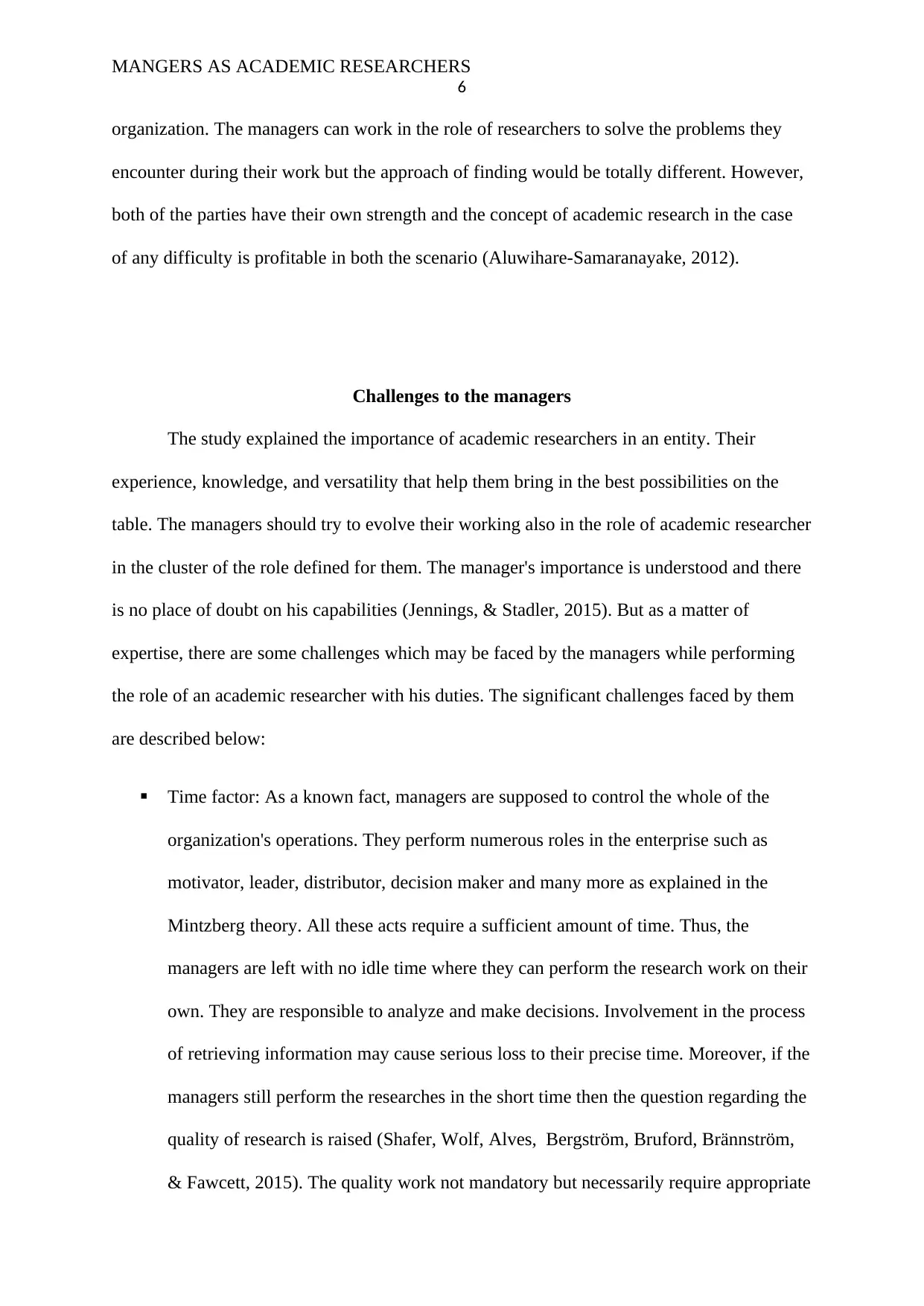
MANGERS AS ACADEMIC RESEARCHERS
6
organization. The managers can work in the role of researchers to solve the problems they
encounter during their work but the approach of finding would be totally different. However,
both of the parties have their own strength and the concept of academic research in the case
of any difficulty is profitable in both the scenario (Aluwihare-Samaranayake, 2012).
Challenges to the managers
The study explained the importance of academic researchers in an entity. Their
experience, knowledge, and versatility that help them bring in the best possibilities on the
table. The managers should try to evolve their working also in the role of academic researcher
in the cluster of the role defined for them. The manager's importance is understood and there
is no place of doubt on his capabilities (Jennings, & Stadler, 2015). But as a matter of
expertise, there are some challenges which may be faced by the managers while performing
the role of an academic researcher with his duties. The significant challenges faced by them
are described below:
Time factor: As a known fact, managers are supposed to control the whole of the
organization's operations. They perform numerous roles in the enterprise such as
motivator, leader, distributor, decision maker and many more as explained in the
Mintzberg theory. All these acts require a sufficient amount of time. Thus, the
managers are left with no idle time where they can perform the research work on their
own. They are responsible to analyze and make decisions. Involvement in the process
of retrieving information may cause serious loss to their precise time. Moreover, if the
managers still perform the researches in the short time then the question regarding the
quality of research is raised (Shafer, Wolf, Alves, Bergström, Bruford, Brännström,
& Fawcett, 2015). The quality work not mandatory but necessarily require appropriate
6
organization. The managers can work in the role of researchers to solve the problems they
encounter during their work but the approach of finding would be totally different. However,
both of the parties have their own strength and the concept of academic research in the case
of any difficulty is profitable in both the scenario (Aluwihare-Samaranayake, 2012).
Challenges to the managers
The study explained the importance of academic researchers in an entity. Their
experience, knowledge, and versatility that help them bring in the best possibilities on the
table. The managers should try to evolve their working also in the role of academic researcher
in the cluster of the role defined for them. The manager's importance is understood and there
is no place of doubt on his capabilities (Jennings, & Stadler, 2015). But as a matter of
expertise, there are some challenges which may be faced by the managers while performing
the role of an academic researcher with his duties. The significant challenges faced by them
are described below:
Time factor: As a known fact, managers are supposed to control the whole of the
organization's operations. They perform numerous roles in the enterprise such as
motivator, leader, distributor, decision maker and many more as explained in the
Mintzberg theory. All these acts require a sufficient amount of time. Thus, the
managers are left with no idle time where they can perform the research work on their
own. They are responsible to analyze and make decisions. Involvement in the process
of retrieving information may cause serious loss to their precise time. Moreover, if the
managers still perform the researches in the short time then the question regarding the
quality of research is raised (Shafer, Wolf, Alves, Bergström, Bruford, Brännström,
& Fawcett, 2015). The quality work not mandatory but necessarily require appropriate
Paraphrase This Document
Need a fresh take? Get an instant paraphrase of this document with our AI Paraphraser
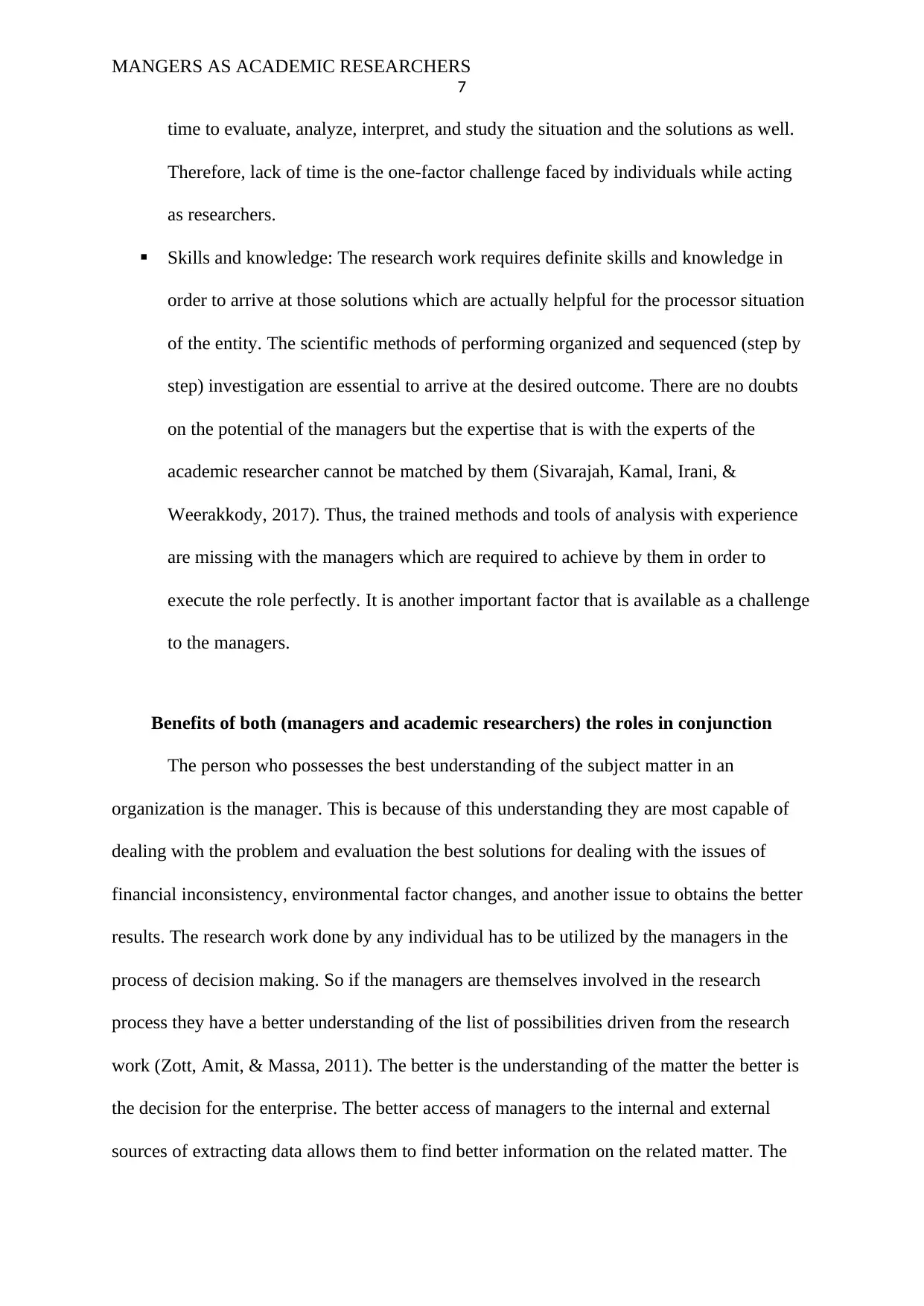
MANGERS AS ACADEMIC RESEARCHERS
7
time to evaluate, analyze, interpret, and study the situation and the solutions as well.
Therefore, lack of time is the one-factor challenge faced by individuals while acting
as researchers.
Skills and knowledge: The research work requires definite skills and knowledge in
order to arrive at those solutions which are actually helpful for the processor situation
of the entity. The scientific methods of performing organized and sequenced (step by
step) investigation are essential to arrive at the desired outcome. There are no doubts
on the potential of the managers but the expertise that is with the experts of the
academic researcher cannot be matched by them (Sivarajah, Kamal, Irani, &
Weerakkody, 2017). Thus, the trained methods and tools of analysis with experience
are missing with the managers which are required to achieve by them in order to
execute the role perfectly. It is another important factor that is available as a challenge
to the managers.
Benefits of both (managers and academic researchers) the roles in conjunction
The person who possesses the best understanding of the subject matter in an
organization is the manager. This is because of this understanding they are most capable of
dealing with the problem and evaluation the best solutions for dealing with the issues of
financial inconsistency, environmental factor changes, and another issue to obtains the better
results. The research work done by any individual has to be utilized by the managers in the
process of decision making. So if the managers are themselves involved in the research
process they have a better understanding of the list of possibilities driven from the research
work (Zott, Amit, & Massa, 2011). The better is the understanding of the matter the better is
the decision for the enterprise. The better access of managers to the internal and external
sources of extracting data allows them to find better information on the related matter. The
7
time to evaluate, analyze, interpret, and study the situation and the solutions as well.
Therefore, lack of time is the one-factor challenge faced by individuals while acting
as researchers.
Skills and knowledge: The research work requires definite skills and knowledge in
order to arrive at those solutions which are actually helpful for the processor situation
of the entity. The scientific methods of performing organized and sequenced (step by
step) investigation are essential to arrive at the desired outcome. There are no doubts
on the potential of the managers but the expertise that is with the experts of the
academic researcher cannot be matched by them (Sivarajah, Kamal, Irani, &
Weerakkody, 2017). Thus, the trained methods and tools of analysis with experience
are missing with the managers which are required to achieve by them in order to
execute the role perfectly. It is another important factor that is available as a challenge
to the managers.
Benefits of both (managers and academic researchers) the roles in conjunction
The person who possesses the best understanding of the subject matter in an
organization is the manager. This is because of this understanding they are most capable of
dealing with the problem and evaluation the best solutions for dealing with the issues of
financial inconsistency, environmental factor changes, and another issue to obtains the better
results. The research work done by any individual has to be utilized by the managers in the
process of decision making. So if the managers are themselves involved in the research
process they have a better understanding of the list of possibilities driven from the research
work (Zott, Amit, & Massa, 2011). The better is the understanding of the matter the better is
the decision for the enterprise. The better access of managers to the internal and external
sources of extracting data allows them to find better information on the related matter. The
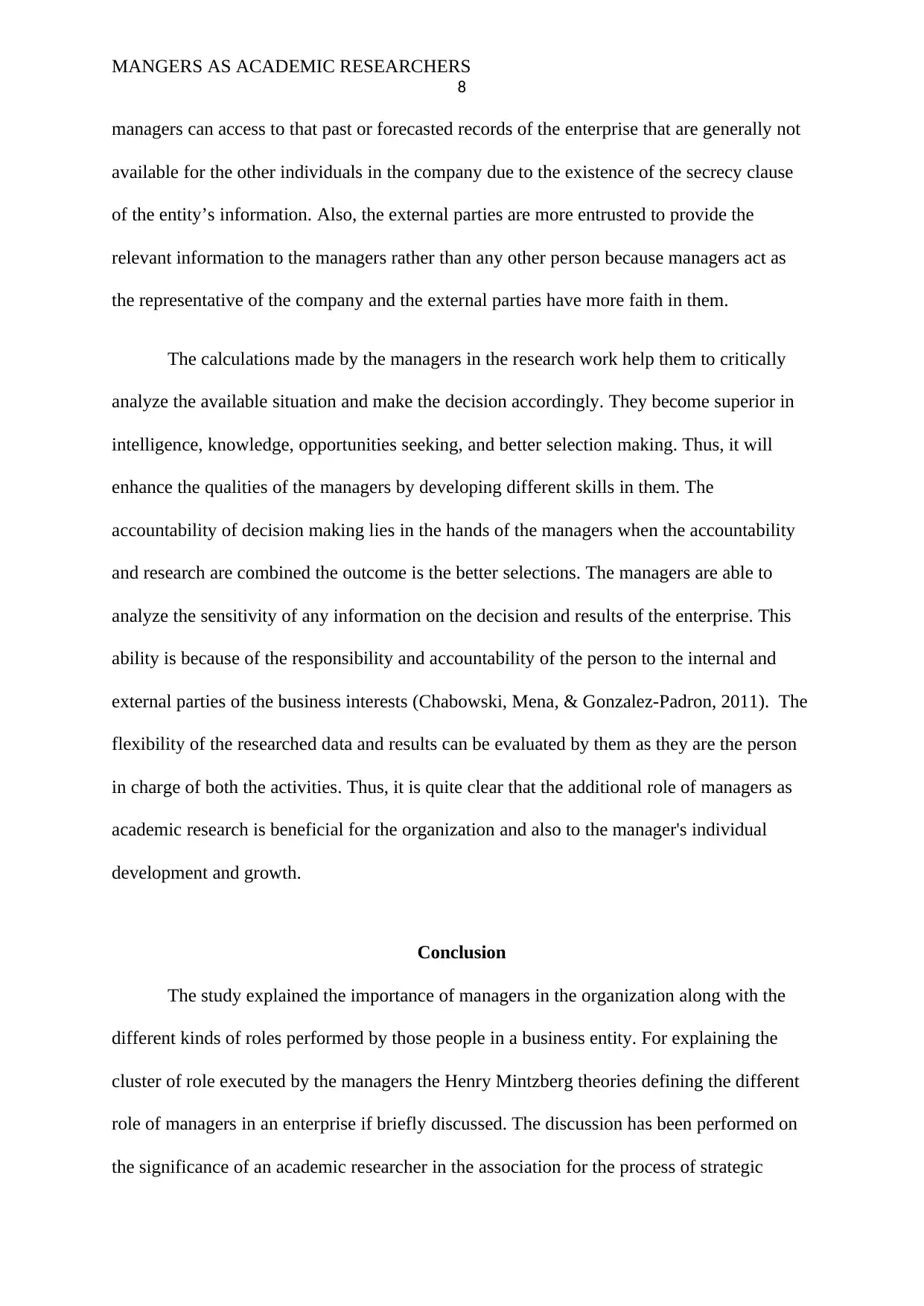
MANGERS AS ACADEMIC RESEARCHERS
8
managers can access to that past or forecasted records of the enterprise that are generally not
available for the other individuals in the company due to the existence of the secrecy clause
of the entity’s information. Also, the external parties are more entrusted to provide the
relevant information to the managers rather than any other person because managers act as
the representative of the company and the external parties have more faith in them.
The calculations made by the managers in the research work help them to critically
analyze the available situation and make the decision accordingly. They become superior in
intelligence, knowledge, opportunities seeking, and better selection making. Thus, it will
enhance the qualities of the managers by developing different skills in them. The
accountability of decision making lies in the hands of the managers when the accountability
and research are combined the outcome is the better selections. The managers are able to
analyze the sensitivity of any information on the decision and results of the enterprise. This
ability is because of the responsibility and accountability of the person to the internal and
external parties of the business interests (Chabowski, Mena, & Gonzalez-Padron, 2011). The
flexibility of the researched data and results can be evaluated by them as they are the person
in charge of both the activities. Thus, it is quite clear that the additional role of managers as
academic research is beneficial for the organization and also to the manager's individual
development and growth.
Conclusion
The study explained the importance of managers in the organization along with the
different kinds of roles performed by those people in a business entity. For explaining the
cluster of role executed by the managers the Henry Mintzberg theories defining the different
role of managers in an enterprise if briefly discussed. The discussion has been performed on
the significance of an academic researcher in the association for the process of strategic
8
managers can access to that past or forecasted records of the enterprise that are generally not
available for the other individuals in the company due to the existence of the secrecy clause
of the entity’s information. Also, the external parties are more entrusted to provide the
relevant information to the managers rather than any other person because managers act as
the representative of the company and the external parties have more faith in them.
The calculations made by the managers in the research work help them to critically
analyze the available situation and make the decision accordingly. They become superior in
intelligence, knowledge, opportunities seeking, and better selection making. Thus, it will
enhance the qualities of the managers by developing different skills in them. The
accountability of decision making lies in the hands of the managers when the accountability
and research are combined the outcome is the better selections. The managers are able to
analyze the sensitivity of any information on the decision and results of the enterprise. This
ability is because of the responsibility and accountability of the person to the internal and
external parties of the business interests (Chabowski, Mena, & Gonzalez-Padron, 2011). The
flexibility of the researched data and results can be evaluated by them as they are the person
in charge of both the activities. Thus, it is quite clear that the additional role of managers as
academic research is beneficial for the organization and also to the manager's individual
development and growth.
Conclusion
The study explained the importance of managers in the organization along with the
different kinds of roles performed by those people in a business entity. For explaining the
cluster of role executed by the managers the Henry Mintzberg theories defining the different
role of managers in an enterprise if briefly discussed. The discussion has been performed on
the significance of an academic researcher in the association for the process of strategic
⊘ This is a preview!⊘
Do you want full access?
Subscribe today to unlock all pages.

Trusted by 1+ million students worldwide
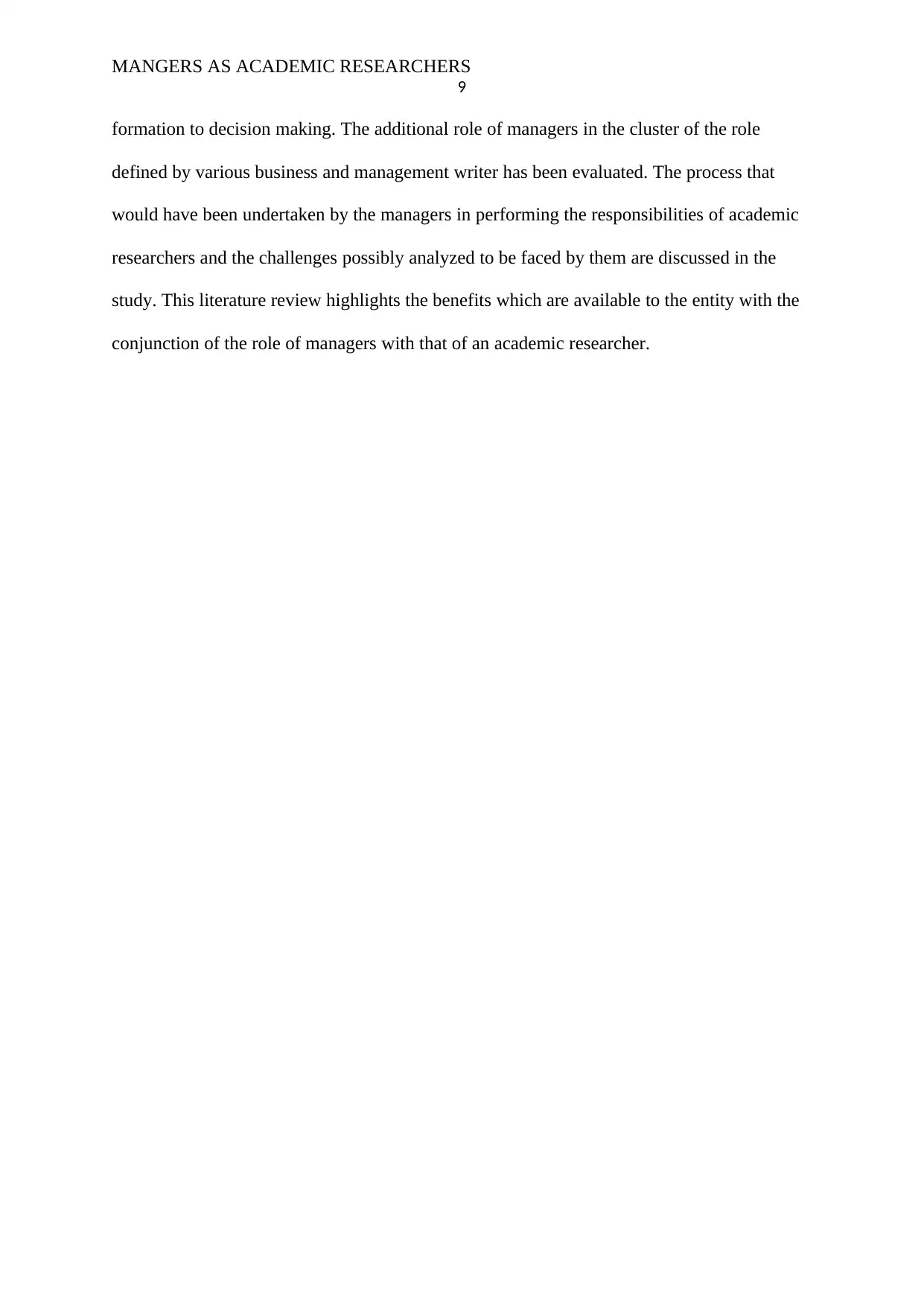
MANGERS AS ACADEMIC RESEARCHERS
9
formation to decision making. The additional role of managers in the cluster of the role
defined by various business and management writer has been evaluated. The process that
would have been undertaken by the managers in performing the responsibilities of academic
researchers and the challenges possibly analyzed to be faced by them are discussed in the
study. This literature review highlights the benefits which are available to the entity with the
conjunction of the role of managers with that of an academic researcher.
9
formation to decision making. The additional role of managers in the cluster of the role
defined by various business and management writer has been evaluated. The process that
would have been undertaken by the managers in performing the responsibilities of academic
researchers and the challenges possibly analyzed to be faced by them are discussed in the
study. This literature review highlights the benefits which are available to the entity with the
conjunction of the role of managers with that of an academic researcher.
Paraphrase This Document
Need a fresh take? Get an instant paraphrase of this document with our AI Paraphraser
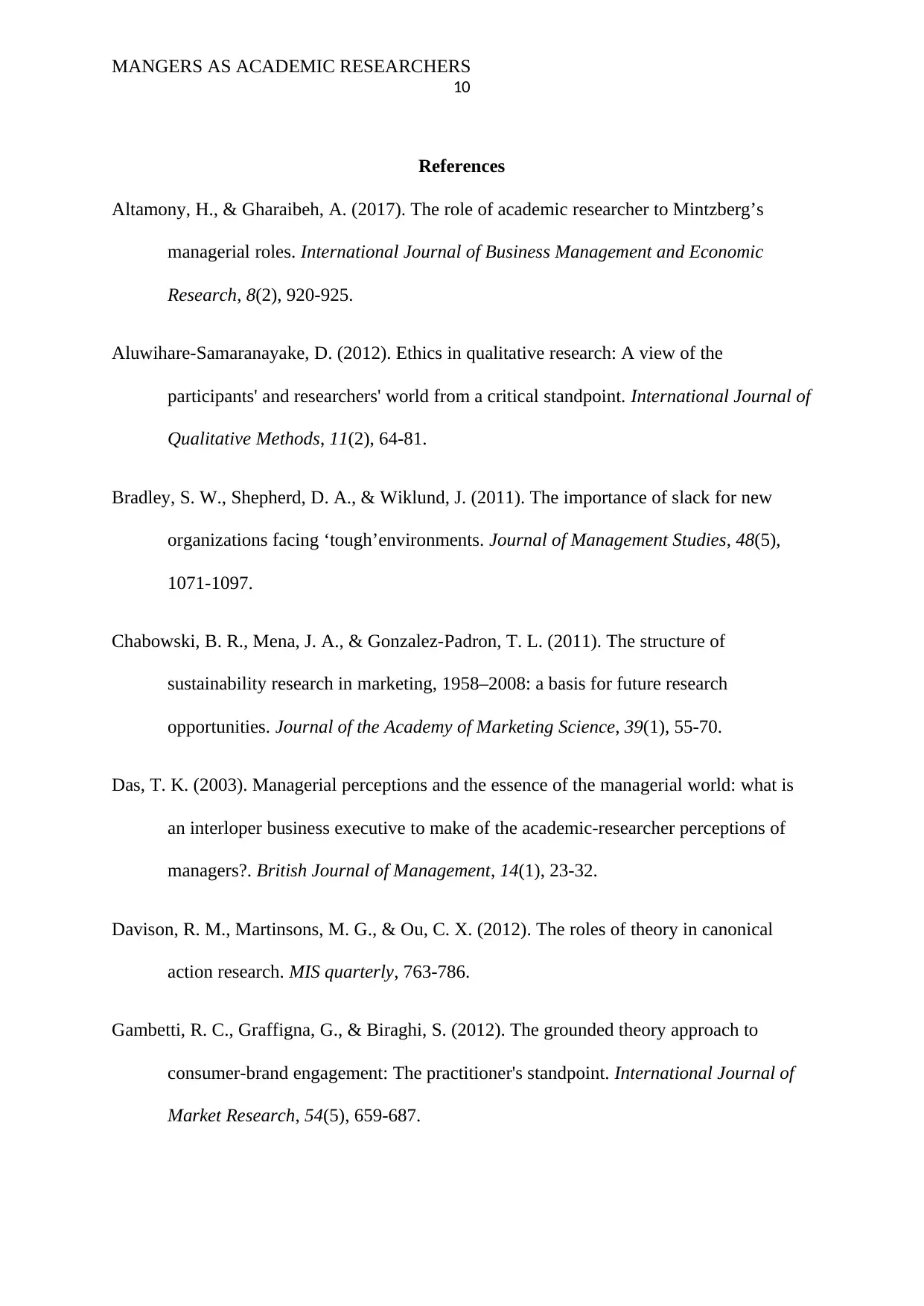
MANGERS AS ACADEMIC RESEARCHERS
10
References
Altamony, H., & Gharaibeh, A. (2017). The role of academic researcher to Mintzberg’s
managerial roles. International Journal of Business Management and Economic
Research, 8(2), 920-925.
Aluwihare-Samaranayake, D. (2012). Ethics in qualitative research: A view of the
participants' and researchers' world from a critical standpoint. International Journal of
Qualitative Methods, 11(2), 64-81.
Bradley, S. W., Shepherd, D. A., & Wiklund, J. (2011). The importance of slack for new
organizations facing ‘tough’environments. Journal of Management Studies, 48(5),
1071-1097.
Chabowski, B. R., Mena, J. A., & Gonzalez-Padron, T. L. (2011). The structure of
sustainability research in marketing, 1958–2008: a basis for future research
opportunities. Journal of the Academy of Marketing Science, 39(1), 55-70.
Das, T. K. (2003). Managerial perceptions and the essence of the managerial world: what is
an interloper business executive to make of the academic‐researcher perceptions of
managers?. British Journal of Management, 14(1), 23-32.
Davison, R. M., Martinsons, M. G., & Ou, C. X. (2012). The roles of theory in canonical
action research. MIS quarterly, 763-786.
Gambetti, R. C., Graffigna, G., & Biraghi, S. (2012). The grounded theory approach to
consumer-brand engagement: The practitioner's standpoint. International Journal of
Market Research, 54(5), 659-687.
10
References
Altamony, H., & Gharaibeh, A. (2017). The role of academic researcher to Mintzberg’s
managerial roles. International Journal of Business Management and Economic
Research, 8(2), 920-925.
Aluwihare-Samaranayake, D. (2012). Ethics in qualitative research: A view of the
participants' and researchers' world from a critical standpoint. International Journal of
Qualitative Methods, 11(2), 64-81.
Bradley, S. W., Shepherd, D. A., & Wiklund, J. (2011). The importance of slack for new
organizations facing ‘tough’environments. Journal of Management Studies, 48(5),
1071-1097.
Chabowski, B. R., Mena, J. A., & Gonzalez-Padron, T. L. (2011). The structure of
sustainability research in marketing, 1958–2008: a basis for future research
opportunities. Journal of the Academy of Marketing Science, 39(1), 55-70.
Das, T. K. (2003). Managerial perceptions and the essence of the managerial world: what is
an interloper business executive to make of the academic‐researcher perceptions of
managers?. British Journal of Management, 14(1), 23-32.
Davison, R. M., Martinsons, M. G., & Ou, C. X. (2012). The roles of theory in canonical
action research. MIS quarterly, 763-786.
Gambetti, R. C., Graffigna, G., & Biraghi, S. (2012). The grounded theory approach to
consumer-brand engagement: The practitioner's standpoint. International Journal of
Market Research, 54(5), 659-687.
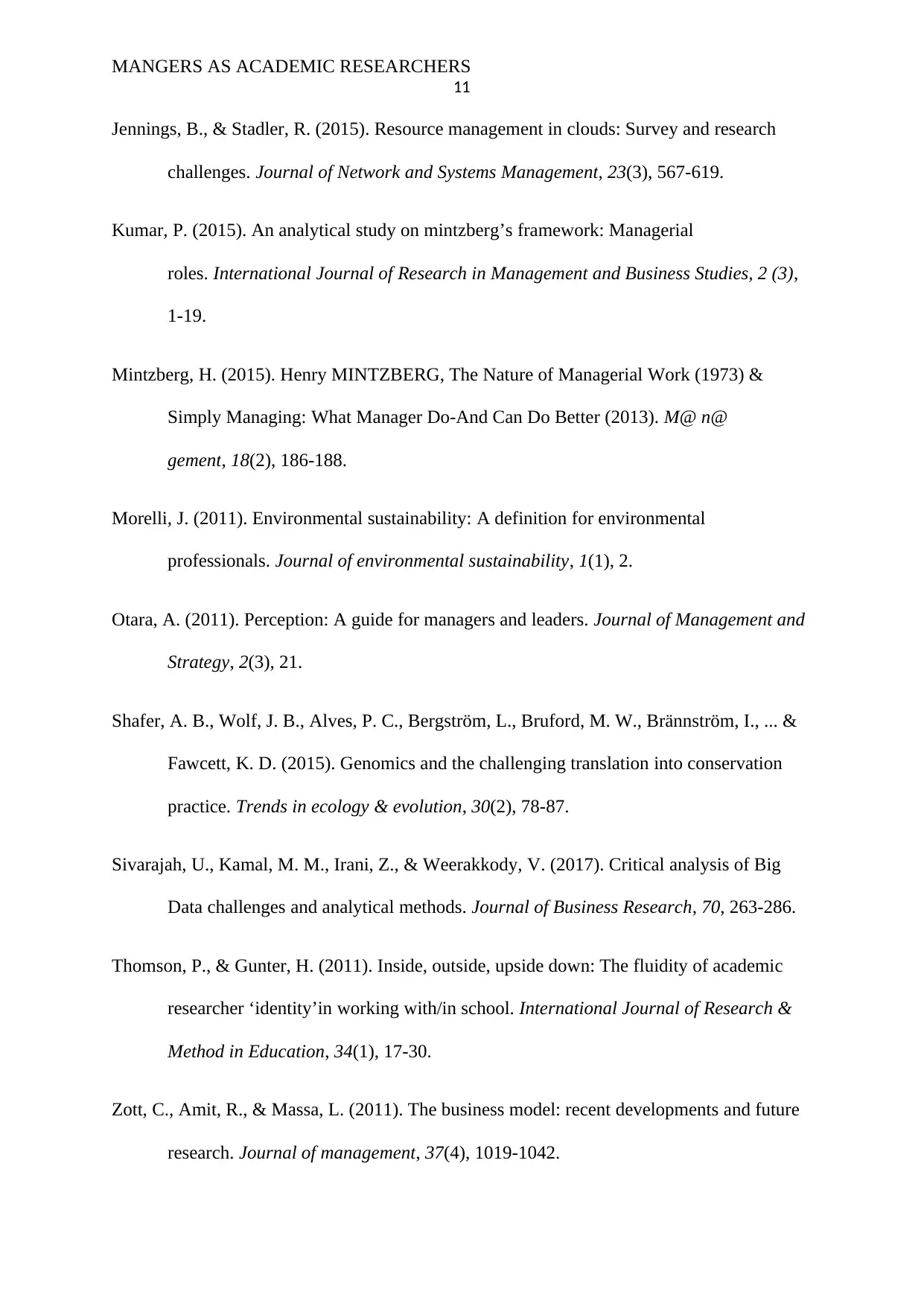
MANGERS AS ACADEMIC RESEARCHERS
11
Jennings, B., & Stadler, R. (2015). Resource management in clouds: Survey and research
challenges. Journal of Network and Systems Management, 23(3), 567-619.
Kumar, P. (2015). An analytical study on mintzberg’s framework: Managerial
roles. International Journal of Research in Management and Business Studies, 2 (3),
1-19.
Mintzberg, H. (2015). Henry MINTZBERG, The Nature of Managerial Work (1973) &
Simply Managing: What Manager Do-And Can Do Better (2013). M@ n@
gement, 18(2), 186-188.
Morelli, J. (2011). Environmental sustainability: A definition for environmental
professionals. Journal of environmental sustainability, 1(1), 2.
Otara, A. (2011). Perception: A guide for managers and leaders. Journal of Management and
Strategy, 2(3), 21.
Shafer, A. B., Wolf, J. B., Alves, P. C., Bergström, L., Bruford, M. W., Brännström, I., ... &
Fawcett, K. D. (2015). Genomics and the challenging translation into conservation
practice. Trends in ecology & evolution, 30(2), 78-87.
Sivarajah, U., Kamal, M. M., Irani, Z., & Weerakkody, V. (2017). Critical analysis of Big
Data challenges and analytical methods. Journal of Business Research, 70, 263-286.
Thomson, P., & Gunter, H. (2011). Inside, outside, upside down: The fluidity of academic
researcher ‘identity’in working with/in school. International Journal of Research &
Method in Education, 34(1), 17-30.
Zott, C., Amit, R., & Massa, L. (2011). The business model: recent developments and future
research. Journal of management, 37(4), 1019-1042.
11
Jennings, B., & Stadler, R. (2015). Resource management in clouds: Survey and research
challenges. Journal of Network and Systems Management, 23(3), 567-619.
Kumar, P. (2015). An analytical study on mintzberg’s framework: Managerial
roles. International Journal of Research in Management and Business Studies, 2 (3),
1-19.
Mintzberg, H. (2015). Henry MINTZBERG, The Nature of Managerial Work (1973) &
Simply Managing: What Manager Do-And Can Do Better (2013). M@ n@
gement, 18(2), 186-188.
Morelli, J. (2011). Environmental sustainability: A definition for environmental
professionals. Journal of environmental sustainability, 1(1), 2.
Otara, A. (2011). Perception: A guide for managers and leaders. Journal of Management and
Strategy, 2(3), 21.
Shafer, A. B., Wolf, J. B., Alves, P. C., Bergström, L., Bruford, M. W., Brännström, I., ... &
Fawcett, K. D. (2015). Genomics and the challenging translation into conservation
practice. Trends in ecology & evolution, 30(2), 78-87.
Sivarajah, U., Kamal, M. M., Irani, Z., & Weerakkody, V. (2017). Critical analysis of Big
Data challenges and analytical methods. Journal of Business Research, 70, 263-286.
Thomson, P., & Gunter, H. (2011). Inside, outside, upside down: The fluidity of academic
researcher ‘identity’in working with/in school. International Journal of Research &
Method in Education, 34(1), 17-30.
Zott, C., Amit, R., & Massa, L. (2011). The business model: recent developments and future
research. Journal of management, 37(4), 1019-1042.
⊘ This is a preview!⊘
Do you want full access?
Subscribe today to unlock all pages.

Trusted by 1+ million students worldwide
1 out of 12
Related Documents
Your All-in-One AI-Powered Toolkit for Academic Success.
+13062052269
info@desklib.com
Available 24*7 on WhatsApp / Email
![[object Object]](/_next/static/media/star-bottom.7253800d.svg)
Unlock your academic potential
Copyright © 2020–2026 A2Z Services. All Rights Reserved. Developed and managed by ZUCOL.




